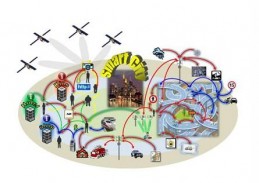‘Smart’ cities will likely link devices intelligently
May 17, 2011

The concept of a smart city allows a system-wide integration of different mobile and context sensitive services (credit: TU Darmstadt)
The Cocoon (Cooperative Sensor Communications) project, based on the vision of “smart” cities in which all devices within municipal areas are intelligently linked to one another, is being implemented by researchers at TU Darmstadt and the University of Kassel in Germany.
The backbone of a “smart” city is a communications network consisting of sensors that receive streams of data, or signals, analyze them, and transmit them onward.
In the model of the existing “Smart Home” control systems already on the market, the researchers envision avoiding traffic jams in cities by car-to-car or car-to-environment (car-to-X) communications. They also see health-service systems benefiting from mobile, sensor communications whenever patients need to be kept supplied with information tailored to suit their healthcare needs while underway.
The researchers intend to create conditions under which sensor antennae will, in the future, behave like spotlights: once they have located a sought device, they will track it while suppressing ambient interference from stray electromagnetic radiation from other devices.
The researchers regard the movement of sensors on mobile systems and their frequent entries into/exits from instrumented areas as the major hurdle to be overcome in implementing their vision of “smart” cities.
The project is funded by the State of Hesse’s Offensive for Developing Scientific-Economic Excellence.